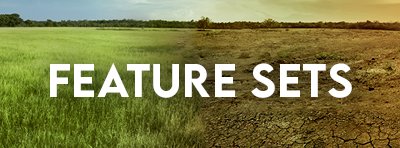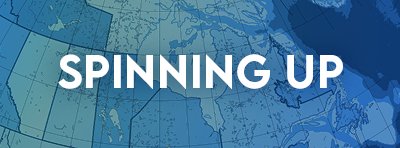
Collaborate with the C1W team! (Jan 2023 update)
To broaden the number of project collaborators, the project has an ongoing series of engagement meetings with potential collaborators.

CBC News - Season for critical northern Ontario ice road getting shorter, says road builder
A new article on CBC News discusses climate change's impacts on northern Ontario ice roads. With temperatures warming, the season that these roads can be active is getting shorter and transportation through the region more difficult and expensive. One key outcome of the C1W project will be modelled snow depth for all Canada, making it easier to predict how the insulative properties of snow might affect ice road viability to the end of century in northern Canadian communities.

A hydrologic time machine
Once it’s up and running, Canada1Water will allow users to track the evolution of groundwater and surface water flows backward and forward in time — from 1979 through to the year 2100. Dr. Steve Frey provides an overview of the modelling framework driving the Canada1Water project.

Clearing the path to project snow on a continental scale
Precipitation is crucial to any climate model — and in Canada that often means snow. While snow can be modelled accurately on small scales with good weather data, projecting its effects continent-wide and far into the future is a whole other story. Senior Climate Scientist Andre Erler and his team are solving the puzzle by coupling innovative bias correction with climate projections to enable Canada1Water’s long-term view.

Putting the pieces together – and making sure they fit
Canada’s provinces, territories and local governments collect groundwater and surface water data. But there’s little standardization, and hydrologic systems don’t obey political borders anyway. That’s why hydrogeologist Eric Kessel and his colleagues are working hard to bring the disparate datasets together in a harmonized view for Canada1Water.

“This has never been done before”
With C1W reaching the midpoint of its 3-year development, Aquanty co-founder Ed Sudicky reflects on the project’s origins, progress — and what’s next.

C1W Feature in the Winter 2023 Edition of Ground Water Canada – Water Data Not Seen Before
“A conceptually, comprehensive, physically based hydrologic modelling platform developed by a Canadian company is changing the way we think about, study and plan water resources – surface and groundwater – in Canada, now and long into the future.” A new feature in Ground Water Canada puts a spotlight on the Canada1Water project, detailing the mission of this world-class modelling project and exploring potential use cases.

The Guardian – Half of glaciers will be gone by 2100 even under Paris 1.5C accord, study finds
This article from The Guardian summarizes a new study, published in Science, describing the devastating effects of rising global temperatures on the world’s glaciers. Understanding this extreme shift in glacier melt is one goal for the Canada1Water project, as it will become increasingly important to understand what effects this melt will cause on regional hydrology.

CBC News - What one region's water level woes reveal about climate change and the St. Lawrence River
A new article by CBC highlights the impact of climate change on the St. Lawrence seaway water levels, and how these changing water levels are threatening tourism and the long-term sustainability of the St. Lawrence seaway, a massive economic powerhouse for Canadian industry.

CBC News - Climate change could cost municipalities $700M more a year to maintain pipes, sewers, report says
A new report by the Financial Accountability Office of Ontario begins to shed some light on the financial impact that climate change will have on the storm and wastewater infrastructure of Ontario communities.

The Narwhal - Paving wetlands for housing ignores Ontario’s history of floods
In an effort to accelerate housing development, the provincial government has introduced legislation with a slate of proposed changes to wetland policy throughout Ontario. However, environmentalists and water resources professionals are highlighting the dangers of developing wetlands - fragile ecosystems which naturally provide valuable flood mitigation services.

C1W Feature on the First Sixteen Podcast - Modelling the future of water
The First Sixteen is Agriculture Canada’s podcast series that explores the freshest ideas in agriculture, and the latest episode of the podcast is dedicated entirely to the Canada1Water project! The episode features discussion with Aquanty’s Dr. Steve Frey (C1W project co-lead) and AAFC’s Dr. David Lapen (AAFC project lead for C1W).

CBC News - Climate change a 'disaster in slow motion' for places like P.E.I., experts say
Sea-level rise is the cause of ongoing erosion of coastlines around the world (for a devastating example see the P.E.I. coastline before and after Hurricane Fiona).
But climate change will also have a huge impact on the basic water balance of coastal areas (e.g. groundwater-surface water interactions, depth to groundwater) and these impacts will likely extend much further inland than shifting coastlines.

The Globe and Mail - Droughts create brutal challenges for hydroelectric utilities. Is Canada doomed to experience more of them?
A new financial report by Manitoba Hydro illustrates the impacts that drought can have on the energy generation. In 2021 Manitoba (which generates >95% of it’s electricity through hydroelectricity) saw its worst drought in decades, resulting in a net loss of $248-million for Manitoba Hydro (a swing of $367 in net earnings year-over-year). What does the future spell for Manitoba, Quebec, B.C., Newfoundland and Labrador, provinces which rely heavily on hydroelectricity to meet consumer electricity demand?

The Guardian - ‘Nature is striking back’: flooding around the world, from Australia to Venezuela
2022 has been a devastating year for flood related catastrophes; heavy rains and rising waters have caused havoc in countries around the world including Nigeria, Venezuela, Australia, Pakistan, Cambodia, Thailand and Vietnam
